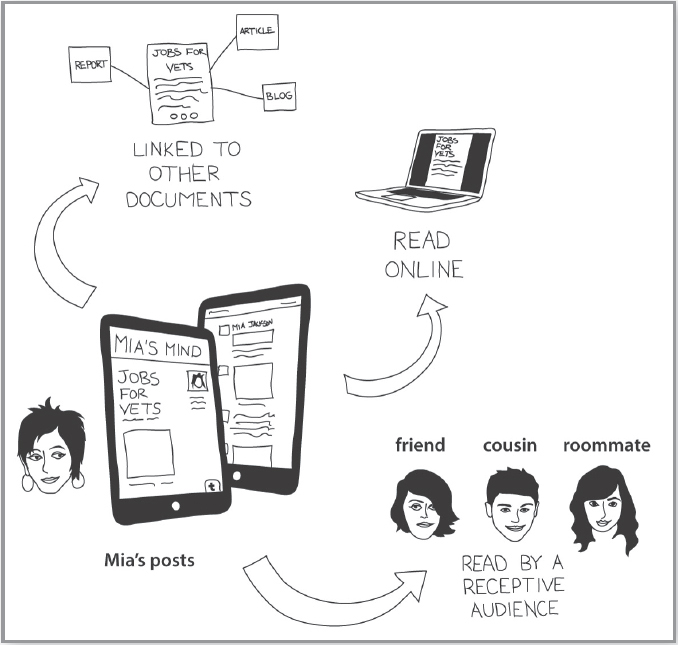Writing Takes Place in Context
Just as in spoken conversations, written conversations are affected by the contexts — or settings — in which they take place.
- Physical context affects how you read and write (on paper or on a computer screen) and how well you can concentrate (for example, consider the differences between trying to read in a noisy, crowded, jolting bus and in a quiet, well-lit room).
- Social context affects how easily writers and readers can understand one another. Readers familiar with topics such as violence in American secondary schools, for example, will not need to be educated about them — they will already know the key points. This reduces the amount of time and effort writers need to devote to providing background information.
- Disciplinary context refers to the shared writing practices, general agreements about appropriate types of documents, and shared assumptions about what is worth writing about common to a particular profession or academic discipline, such as history, accounting, construction management, or chemistry.
- Cultural context refers to a larger set of similarities and differences among readers. For instance, readers from the American Midwest might find it easier to understand the allusions and metaphors used in a document written by someone from Oregon than those in a document written by someone from Peru or Sri Lanka. Similarly, today’s teenagers might find it easier to follow what’s being said in a document written one month ago by a high school senior in Milwaukee than a document written in 1897 by a retired railroad engineer from Saskatchewan.

For students, one of the most important social and cultural contexts shaping their written work is academic life itself, that complex mix of instructors, fellow students, classes, tests, labs, and writing assignments that they negotiate on a daily basis. Academic culture — and U.S. and Canadian academic culture in particular — is the product of hundreds of years of arguments, decisions, revisions, and reinventions of a way of thinking and behaving. Academic culture affects far more than how you behave in class, although that’s certainly an important element of it. It also shapes the writing you’ll do during and after your time in college.
In nearly every instance, what you say and how you say it will reflect a combination of contexts. For example, the fact that Mia’s posts were both written and read online allowed her to link directly to other digital documents, such as Facebook, other Web sites, and blogs. At the same time, because her work would be read on a computer monitor, she was cautious about readers having to scroll through multiple screens. As a result, her posts tended to be brief. Because she was writing to an audience that knew her well (friends and family), she didn’t need to provide a great deal of information about her background. And because many of her friends and family shared her connection to the military, she did not feel that she had to justify her beliefs as strongly as she might have were she writing to another group of readers.